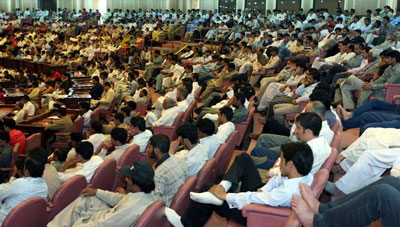 |
| Overview of congress |
The second day of the congress saw more than 2000 delegates, members and visitors registered. The enthusiasm of the first day was nothing compared to the second. The discussions revealed a high level of understanding of the tasks that lie ahead. The workers and youth who intervened showed that the Marxist Tendency in Pakistan has come a very long way since its early days in the 1980s.
The day opened up as on the first with the reading of revolutionary poetry and the singing of traditional songs from the Pakistani labour movement. The words of one song were particularly poignant:
"We will not be happy with taking one country; we want the whole world, because we are the workers of the world."
Comrade Ilyas Kahn chaired the session. He is a comrade that has a long history of struggle. He was in prison with comrade Lal Khan in the 1980s and they were both lashed by the terrible Zia regime. In his opening remarks comrade Ilyas Khan reminded the congress that back in 1998 Ted Grant had predicted that the ruling class would one day hand over government to the PPP. That brilliant prediction has been vindicated by events.
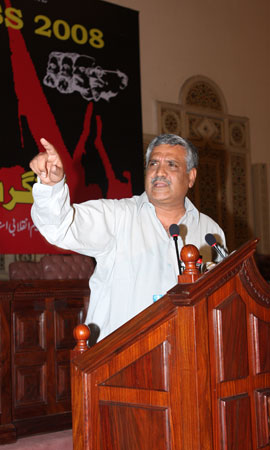 |
| Comrade Lal Khan introducing the discussion on Pakistan Perspectives |
Lal Khan then introduced the discussion on Pakistan Perspectives. He stressed the corrupt nature of the Pakistani bourgeoisie and also underlined the conflict which is going within the state. He referred to the so-called conflict between "civil society" and the military. He emphasized what a sham "democracy" is in Pakistan. But he also explained that "dictatorship" has also lost its meaning in Pakistan. The Musharraf dictatorship was nothing compared to that of Zia-ul-Haq! In explaining this he said "comrade Jam Saqi knows what I mean". Comrade Saqi was once the General Secretary of the Pakistan Communist Party and spent eight years in terrible conditions in one of Zia's jails, and is now a leading member of The Struggle.
Comrade Lal Khan highlighted the differences in Pakistani society, the class differences. He witnessed a so-called "civil society" rally on the question of the judiciary. Many middle class and bourgeois women were demonstrating. Lal Khan noticed some working class women who were watching. They were dirty, sweaty and carrying shovels. He asked them what they were looking at. They answered simply, "the colours", referring to the beautiful dresses of these well-off ladies. This succinctly described the difference between "civil society" and what the comrades now describe as "uncivil society" to which they proudly explain they also belong! Lal Kahn explained that, "From within these dirty, smelly bodies revolution is brewing".
He went on to outline the intervention of The Struggle in the movement of two million who turned out to welcome Benazir Bhutto upon her return in October. He described that movement as that of "uncivil society looking to Bhutto for change." But he also described how Bhutto was affected by the mass movement and how she began to give it expression by suddenly turning to the left denouncing privatization and so on. The state could not tolerate this radical turn and that explains why the fundamentalist wing of the state decided to assassinate her, while the "liberal wing" were too terrified to do anything.
He emphasized the point that if the Marxists had had 5000 or 10,000 supporters in those events things would have turned out very differently. The Marxists called for a general strike, but they were too weak. "We had quality but not quantity" is the way he put it.
He dealt with the question of electoral fraud, the position of the PPP as it enters into an alliance with the direct agents of the bourgeois and even makes deals with the hated fascist MQM in Karachi! He pointed out how the new Gillani government cannot solve any of the basic problems facing the Pakistani workers and poor.
He explained how the ruling class of Pakistan exploits the national question. They cannot solve it but they exploit it. He ended up by saying, "We will stop the war in Kashmir not through pacifist methods but through revolution!"
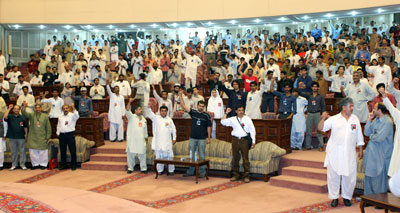 |
| Singing of the 'Internationale' |
His speech was followed by a worker from PIA who highlighted how degenerate the Trade Union leaders had become. He contrasted their behaviour to that of comrade Manzoor when he was an MP, when he unstintingly battled for the lifting of the ban on trade unions.
There followed interventions from comrade Nadir from Baluchistan and Shujuat Kazmi from Kashmir. He referred to the terrible atrocities committed against the people of Kashmir and explained that, "everywhere, from Kashmir, to Baluchistan, to Waziristan, the answer is Socialist Revolution. In the past there was no revolutionary organization, but now we are here!"
Then a railway worker from Karachi, Manzoor Razi spoke. He expressed how happy he was to see women in the congress and then went on to read a poem against the concept of private property. He quoted the revolutionary poet Habib Jalib, who at the time when Ayub Khan introduced a new constitution wrote a poem in which he said, "You cannot solve our problems", the constitution is "a morning without light."
Another comrade referred to the "seed mafia" in explaining how the peasants are kept poor while the middle-men make the money. Comrade Akram from Rawalpindi said, "I can smell the revolution coming. The only solution is revolution!"
A young comrade, Inam ul-Haq, from the Punjab University, explained how "we are taught that God demands a sacrifice every year, but we sacrifice every day and it seems God still can't hear us."
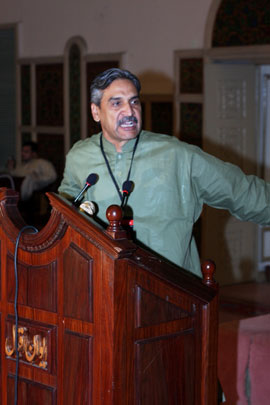 |
| Comrade Manzoor Ahmed explaining the relevance of the ideas of Ted Grant |
Then came the intervention of comrade Manzoor Ahmed. He explained how relevant was the analysis of the situation in Pakistan as developed by comrade Ted Grant, who like Marx had never been to Pakistan, but whose analysis was the most concrete and real. He recounted the experience of 1968 in Pakistan, a lost revolution, and how we must not let that happen again.
He explained how the revolution of 1968 was lost because of the mistakes of the leadership of the PPP at the time. As a result generations have had to suffer. He also explained how the Marxists in the PPP had called on the leaders of the party to call a general strike after the assassination of Bhutto but this call was ignored. Had the Marxists been stronger it would have been a different story.
This was followed by Harish Kumar from Sindh who explained how serious the economic crisis was, underlining that the global nature of the economy meant that a crisis in one country affected all the others.
Fred Weston also intervened in the debate. He warned against the dangers that the new situation presented. He explained that it would be a situation in which the Marxist would come under enormous pressures and that we have to resist these pressures. We must stand out as Marxists. The coming period provides enormous opportunities and we must build on these and prepare to intervene in the dramatic events that will unfold in the coming period.
Lal Khan summed up the discussion, emphasizing that, "we are a Marxist, Bolshevik, Trotskyist tendency with our own independent programme." He put a special emphasis on the need to build the forces of Marxism in Pakistan in the coming period.
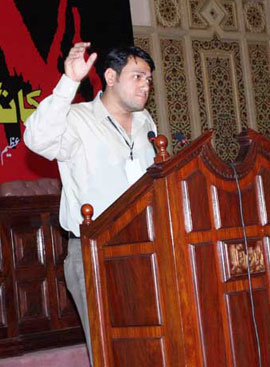 |
| Comrade Adam Pal introduces the session on Organization |
The next session was on Organization, introduced by comrade Adam Pal who outlined how he saw the coming period and the tasks of all comrades in building the organization. He stressed the need for all comrades to consciously build in each area.
Before continuing, a mention should be made of the well furnished bookstall at the congress. Recently and Urdu edition of the Communist Manifesto has been published by the Book Home publishing house. They have also published the first ever edition of Das Kapital in Urdu, with an introduction by Lal Khan. There is such a thirst now for Marxist literature in Pakistan that this publishing house has started producing Marxist classics.
The conference then broke up for the lunch break. On returning to the congress the comrades were welcomed with more revolutionary poetry. Then the Pushtoon comrades all came to the front and sang a revolutionary song in Pushtoon. The atmosphere was electric. Not all the comrades can understand the Pushtoon language, but the word for "revolution" is common to all of them and they all joined in the chorus. They could no longer be stopped as they chanted and danced to the rhythm of the music.
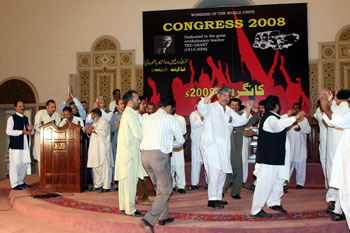 |
| Comrades chanting, singing and dancing |
Time was getting short but the chair could not stop the comrades. The whole congress broke out into an unstoppable bout of singing. Once the Pushtoons had finished the Sindhi comrades all marched down to the front and starting singing their songs. Then came the Kashmiri comrades with their revolutionary songs.
It was a delight to watch. All these different nationalities, with their different languages, singing together. This expressed the genuine desire of workers of all nationalities to come together as one. Then the chanting began: "Socialism will come", and "Revolution, Revolution, Socialist Revolution."
Eventually the comrades calmed down and took their seats. There were reports on the previous night's commissions on Youth work, Women's work and Trade union work. It was reported that the organization has 129 women. Although still a small percentage of the overall membership this is very good considering how difficult it is for women to be involved in political activity in a country where it is frowned upon for women to even be in the same room as men! It was also reported that the membership of the organization now stands at 2518 and that the target for next year is 5100.
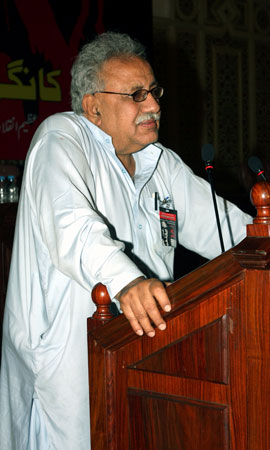 |
| Comrade Jam Saqi, once General Secretary of the Pakistan Communist Party, now a leading member of The Struggle |
Then a special moment was dedicated to comrade Jam Saqi. This is a veteran comrade, who was once the General Secretary of the Pakistan Communist Party. He spent eight years in jail under the brutal Zia dictatorship. He is a legendary figure and a hero to the workers and youth of Pakistan. As he stood up to limp towards the rostrum the whole congress rose as one with a massive round of applause. Comrade Saqi in his speech quoted Archimedes, "Give me a lever and a place to stand and I will move the world". He added that that lever is this organization, the Marxist tendency of The Struggle.
This was followed by a showing of a DVD recording of a speech by Alan Woods (see below). As Alan appeared on the two big screens the whole congress again rose to its feet in applause. It was as if Alan was physically present. In fact many comrades explained how much they missed his presence. There was little time left and so there was no translation of Alan's speech. But about 80% of the comrades have a grasp of English and could follow the speech. There was absolute silence as Alan analysed the world situation, the crisis of capitalism, and the rising class struggle. At the end of the half hour speech again there was a long and rapturous applause.
Then came the report on the development of the International Marxist Tendency around the world, introduced by Fred Weston. Before he started the music of the Internationale was played. All the comrades stood with clenched fists as this was played.
Fred Weston's speech was interrupted several times by applause as he referred to the various new developments and successes of the Tendency internationally. A special applause went to the Mexican comrades. The comrades were pleased to hear of the growing strength and influence of the Venezuelan comrades and were ecstatic about the Esquerda Marxista group joining the International Tendency in Brazil. Special attention was dedicated to the developments in Iran. There are in fact many comrades in Baluchistan who are mother tongue speakers of Farsi, the language of Iran.
The comrades were enthused by the whole report and followed this by a rendition of the Internationale, the singing of which was led significantly by the female comrades who came up to the rostrum.
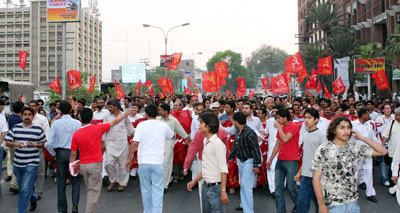 |
| Rally in the streets of Lahore after the congress |
Fred Weston made some concluding remarks about the role of Ted Grant and then the congress left the hall and organised a rally outside the conference hall. The atmosphere on the rally was electric. The slogans and the chanting revealed a mood of enthusiasm and determination to go back to the areas and build the Tendency.
One indication of the mood and morale was the result of the collection. The conference collected the equivalent of a little over 10,000 pounds sterling (20,000 US dollars), a huge amount considering how low wages in Pakistan are.
The workers and youth present at this congress are of a quality that is difficult to describe. A discussion in the evening with the steelworkers of the Karachi Steel Mills revealed a very high level of understanding of the ideas and tasks that lie ahead. We can be confident that these comrades will dedicate the next year to building up the organization and preparing for the great events of the coming period.
Before ending we would like to give a special thanks to comrade Ali Raza, a Hazara comrade from Baluchistan. He is a trade unionist, a member of the Pakistan Paramedical Staff Federation, but he is also an excellent photographer and it is thanks to him that we have the wonderful photographs in today's and yesterday's reports.
Lahore, April 2, 2008
For all photos have a look at the gallery
Alan Woods' message to the congress
See also:
- 27th Congress of The Struggle meets at crucial turning point in Pakistan’s history by our correspondent in Lahore (April 1, 2008)
- Pakistan: Biggest ever gathering of Marxists in Karachi by Adam Pal (March 10, 2008)
- Pakistan: Coalition - no solution! by Lal Khan (February 20, 2008)
- Pakistan elections: The Mother of all Frauds by Alan Woods (February 19, 2008)
- Massive fraud! - An Eyewitness Account by Erik De Bruyn in Karachi (February 19, 2008)